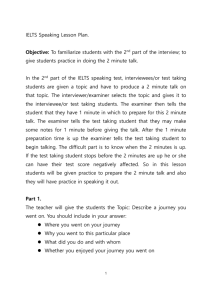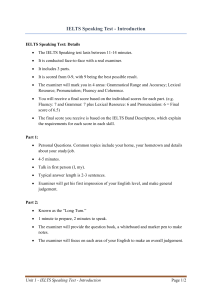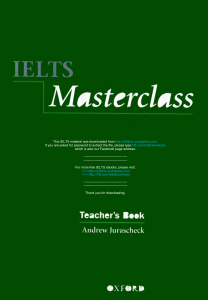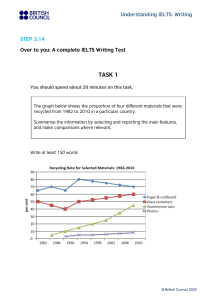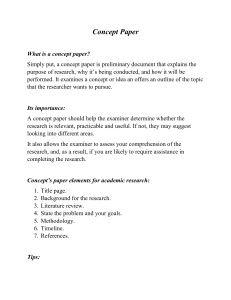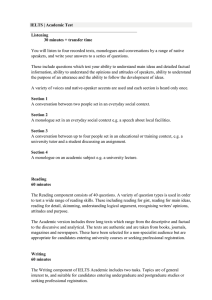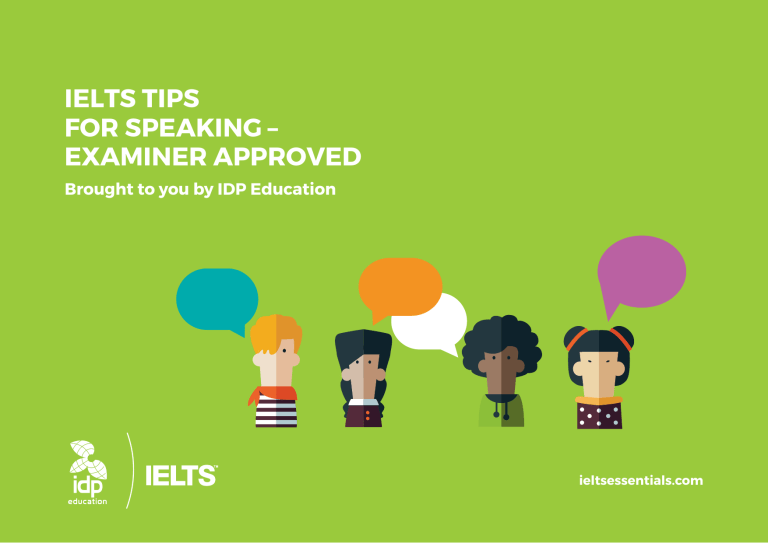
IELTS TIPS FOR SPEAKING – EXAMINER APPROVED Brought to you by IDP Education ieltsessentials.com INTRODUCTION If you’re reading this guide, chances are you’re either preparing for IELTS yourself, or supporting someone who is going to sit the test. You know that preparation is the key to success in IELTS and you’re ready to put the time and effort into improving your English and perfecting your test technique. Whether your goal is to study, work or live in an English-speaking environment, this list of examiner approved test tips will help you to understand what examiners are looking for and provide helpful insights and reminders to help you do your best in the IELTS Speaking test. IDP IELTS Examiner Approved Tips - Speaking | 2 SPEAKING TEST FORMAT The Speaking component is the same for both tests (IELTS Academic and IELTS General Training). There are three parts. The test is recorded. Introduction & Interview (4-5 minutes) The examiner introduces him/herself and asks you to introduce yourself and confirm your identity. The examiner asks you general questions on familiar topics, (e.g. family, work, studies and interests). Individual long turn (3-4 minutes) The examiner gives you a task card which asks you to talk about a particular topic and which includes points you can cover in your talk. You are given one minute to prepare your talk, and you are given a pencil and paper to make notes. You talk for one to two minutes on the topic. The examiner then asks you one or two questions on the same topic. Two-way discussion (4-5 minutes) The examiner asks further questions which are connected to the topic of Part 2. This gives you an opportunity to discuss more general issues and ideas. IDP IELTS Examiner Approved Tips - Speaking | 3 SPEAKING TIPS 1. In the lead up to the Speaking test, make sure you take the time to practise speaking English – with friends, at work and on the phone. You should also consider recording yourself, so that you are confident speaking English during your test. 2. There are no right or wrong answers in the Speaking test. The examiner will assess you on how well you can express your ideas and opinions in good English. 3. It will help you to feel relaxed if you imagine you are talking to a friend. Remember that you are not being assessed on your opinions, rather on your use of English. 4. Try to avoid repeating the words used in the examiner’s question. Use your own words, to show the examiner your full ability. 5. Speak clearly and at a natural pace. If you speak too quickly, you may make mistakes or pronounce words incorrectly. 6. Answer in as much detail as you can. Don’t just answer ‘yes’ or ‘no’. Try to develop your response to each question − draw on your own experience and give examples. The examiner wants to hear whether you can talk at length on a range of topics. IDP IELTS Examiner Approved Tips - Speaking | 4 7. Use the correct verb tense when answering questions in the Speaking test. Listen carefully to the question and notice which verb tense is used. For example, if the question is ‘What kind of music do you like?’ (in the present tense) your answer should also be in the present tense (e.g. ‘I like pop music best’). You can go on to use other tenses as you extend your response, e.g. ‘I haven’t always enjoyed that kind of music...’. 10. In Part 2, the examiner will give you a task card and some paper. You then have one minute to prepare your answer. First think about the topic and then decide which is the most appropriate tense to use in your response. You should use the same tense(s) as the questions on the card. 8. Practise the pronunciation of numbers to be sure that your meaning is clear. For example, many numbers can sound very similar when spoken, so be sure to say them clearly, e.g. ‘Thirty’ and ‘Thirteen’, ‘Forty’ and ‘Fourteen’, ‘Fifty’ and ‘Fifteen’ etc. 11. Try to answer as fully as possible and give reasons for your answers. This will help you to use a wider range of vocabulary and grammar. 9. It is better to use simple, commonly used vocabulary and to use it correctly than to use advanced vocabulary that you are unsure about. However, to get a high score, you must show you know how to use more advanced vocabulary. IDP IELTS Examiner Approved Tips - Speaking | 5 MORE ESSENTIAL TOOLS In addition to the tips provided here, we have a range of other official IDP Education IELTS preparation tools available including: IELTS Support Tools – a step-by-step guide to improve your language and test taking skills, available to download from ieltsessentials.com. IELTS Essentials Facebook Page – an active community of more than 1 million test takers, monitored daily by an IELTS expert who answers questions and posts test tips. IELTS Essentials YouTube Channel – lots of free IELTS preparation videos and support. © Copyright IDP Education Ltd IDP IELTS Examiner Approved Tips - Speaking | 6
